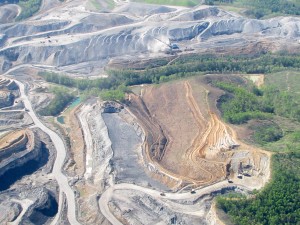- Like
- Digg
- Del
- Tumblr
- VKontakte
- Buffer
- Love This
- Odnoklassniki
- Meneame
- Blogger
- Amazon
- Yahoo Mail
- Gmail
- AOL
- Newsvine
- HackerNews
- Evernote
- MySpace
- Mail.ru
- Viadeo
- Line
- Comments
- Yummly
- SMS
- Viber
- Telegram
- Subscribe
- Skype
- Facebook Messenger
- Kakao
- LiveJournal
- Yammer
- Edgar
- Fintel
- Mix
- Instapaper
- Copy Link
Contact:
Adam Beitman, Sierra Club, (202) 670-5585, adam.beitman@sierraclub.org
Jim Sconyers, West Virginia Sierra Club, (304) 698-9628, jimscon@gmail.com
Dianne Bady, Ohio Valley Environmental Coalition, (304) 522-0246, dbady.ovec@gmail.com
Cindy Rank, West Virginia Highlands Conservancy, (304) 924-5802, clrank2@gmail.com
Patriot Coal’s Hobet 21 Mining Complex a Major Source of Harmful Pollution
Groups Announce Their Intent to Hold Company Accountable for Damaging Streams
Boone County, WV – Citizen and environmental groups have put Patriot Coal Corporation subsidiary Hobet Mining on notice of their intent to sue over the company’s pollution at its sprawling Hobet 21 coal mining complex in Boone County, WV. The groups – Ohio Valley Environmental Coalition, West Virginia Highlands Conservancy, and the Sierra Club – and their attorneys with Appalachian Mountain Advocates have identified multiple ongoing violations of West Virginia’s narrative water quality standards at the mine complex. Specifically, the groups have identified evidence indicating that the company’s water runoff from more than twenty valley fills into the Mud River and its tributaries – including Lukey Fork, Ballard Fork, Berry Branch, Sugartree Branch and Stanley Fork – are extremely high in conductivity pollution. Multiple scientific studies have shown that high conductivity pollution from surface coal mines in Appalachia devastates downstream aquatic communities.
“It’s a shame that the responsibility for protecting West Virginia waterways from harmful mining pollution falls to groups like ours,” said Jim Sconyers of the West Virginia Sierra Club. “This is the state of West Virginia’s job, but they refuse to act despite the overwhelming evidence that coal mining destroys streams and communities.”
The groups’ notice letter identifies evidence including information in permit applications and baseline water quality data from various tributaries in the watershed showing that prior to mining the water quality in the area was characterized by low levels of conductivity pollution. Pre-mining data also shows that the streams were biologically healthy and that many organisms known to be particularly sensitive to conductivity pollution from surface mining were present.
“Illegally high levels of conductivity in streams are a serious problem below mountaintop removal mines but are not typical at deep mines. When coal companies are forced to remedy this widespread contamination, it becomes even clearer that the financial costs of conducting mountaintop removal are much higher than the costs at underground mines” said Diane Bady of the Ohio Valley Environmental Coalition.
Since Hobet began surface mining in the Mud River watershed in the 1980s the ecological health of local streams has declined dramatically. A scientific study published in 2011 examined water monitoring data from the Mud River and its tributaries around the Hobet Mining complex.[1] That study found that upstream of mining, the average conductivity measurement was acceptable, at 156.1 µS/cm, half of the level considered safe by the Environmental Protection Agency. Downstream of mining in the Mud River, however, the average conductivity of all sampling sites was 1293.9 µS/cm, indicating pollution levels were over four times as high as the EPA’s safety benchmark for aquatic organisms. The EPA has identified 300 µS/cm as the level beyond which ionic pollution harms aquatic organisms. The Mud River has been listed as biologically impaired by the West Virginia Department of Environmental Protection since at least 2004. Sugartree Branch, Stanley Fork, and Ballard Fork are also listed as biologically impaired. And although Berry Branch has not yet been officially listed, it was biologically impaired the last time WVDEP measured biological health, in 2008.
“It has been heartbreaking to watch the removal of small communities along Mud River, and the elimination of once thriving streams like Connelly Branch as the large scale surface mines of Hobet 21 have advanced these past three decades. The continued slow decline of aquatic life and water quality in the streams that remain adds insult to injury and is unforgiveable as well as illegal. The company must be compelled to stop polluting the waters of the Mud River valley” said Cindy Rank of the West Virginia Highlands Conservancy.
The citizen groups which filed the suit were represented in this matter by attorneys with Appalachian Mountain Advocates.
[1] Lindberg, et al., “Cumulative Impacts of Mountaintop Mining on an Appalachian Watershed” Proceedings of the National Academy of Science, 108: 20929-34 (2012).








